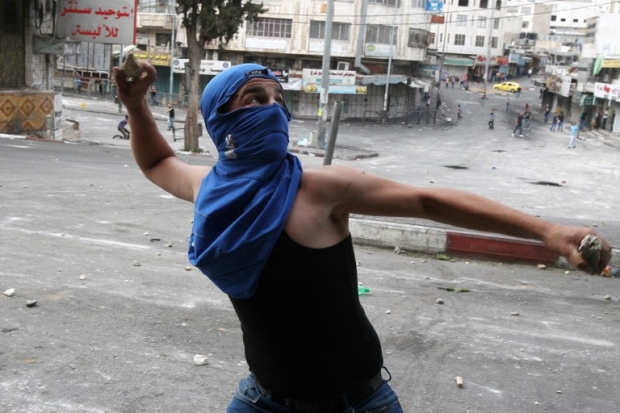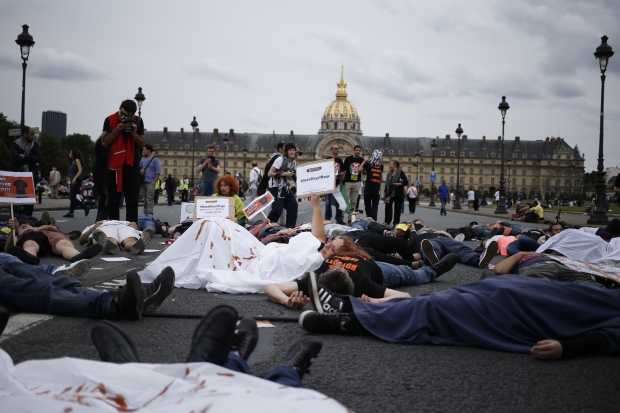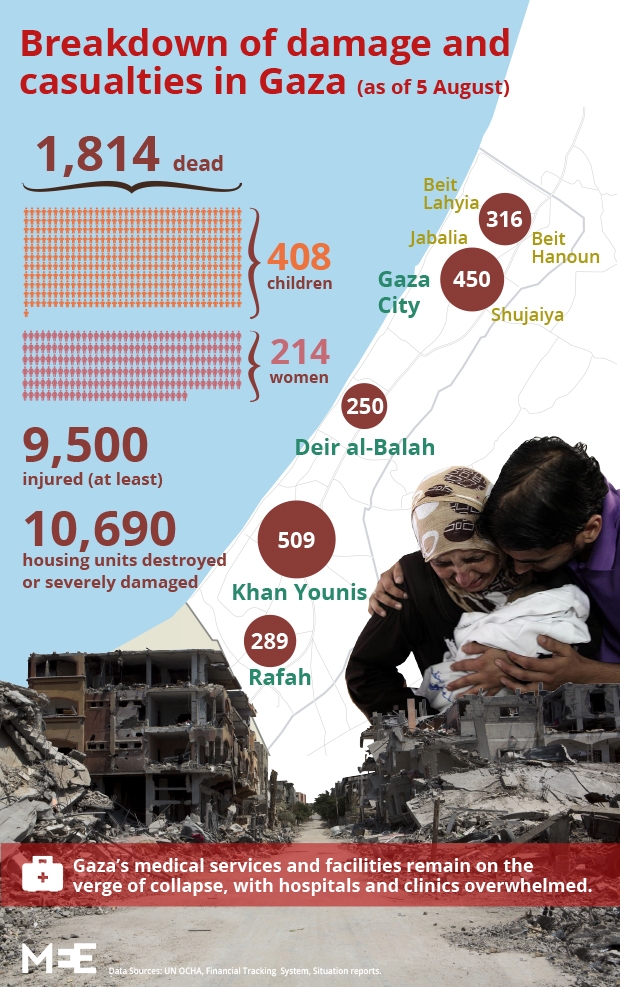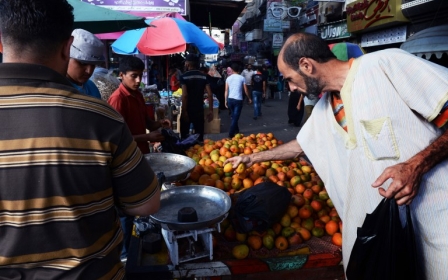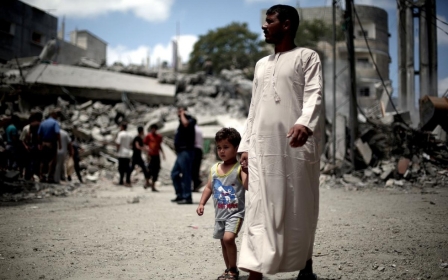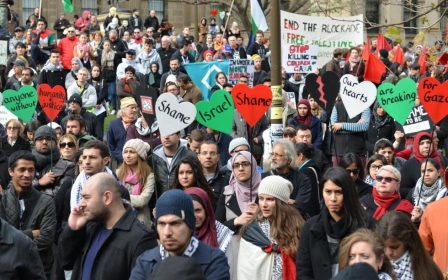Israel pounds Gaza as mediators try to rescue truce
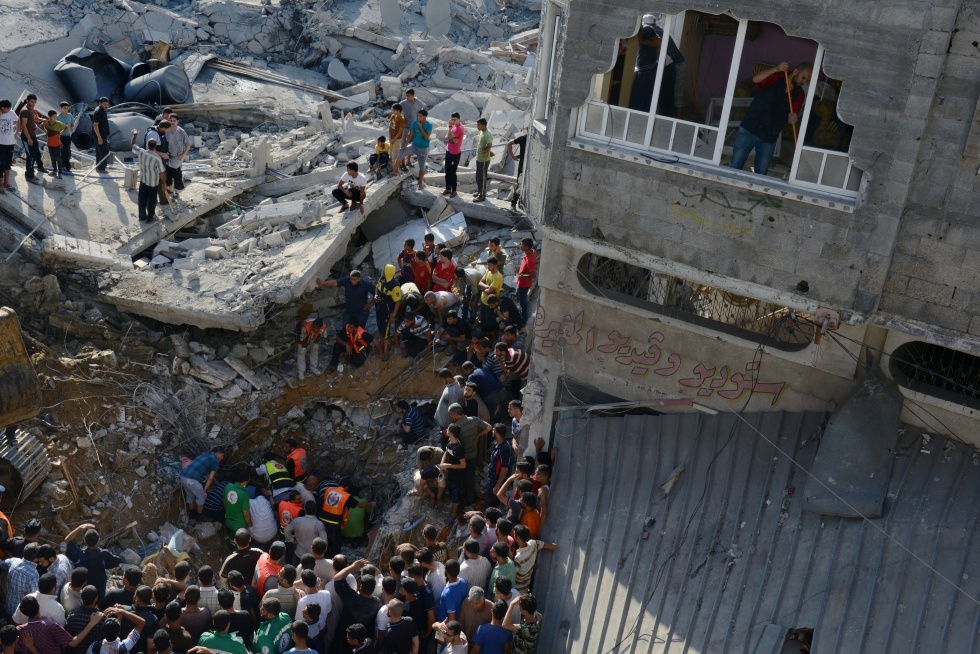
Israeli warplanes pummelled Gaza with 50 air strikes that killed five Palestinians Saturday as militants slammed 23 rockets into Israel, defying international efforts to find a fresh ceasefire.
Tens of thousands of pro-Palestinian demonstrators marched through central London and Cape Town, condemning Israel's one-month military assault on 1.8 million Palestinians in Gaza.
Gaza emergency services said five men were killed in Israeli raids - two travelling by motorcycle through Al-Maghazi refugee camp and three pulled from the rubble of Al-Qassam mosque in the middle of the enclave.
The Palestinian interior ministry said Israeli jets destroyed three mosques. At least two of them were considered close to Hamas.
Resident Ibrahim Taweel said the Israeli military telephoned him at 3am, warning him to evacuate his nearby home five minutes before the mosque was attacked.
"I couldn't tell all my neighbours, so I evacuated myself and my neighbour and after five minutes an F-16 fired one rocket and after that a bigger rocket destroyed the mosque," he said.
The army said 23 rockets rained on Israel, bringing to 61 the number of projectiles launched since a 72-hour truce ended on Friday.
One Israeli civilian and a soldier were wounded on Friday.
Israel said it had carried out more than 100 strikes in Gaza since Friday, 49 of them since midnight, targeting those responsible for the rocket fire.
Clashes in West Bank
In the occupied West Bank, fresh clashes broke out after the funerals of two Palestinian men shot - Mohammed al-Qatary, 20, and Muhammad Idriss, 40 - dead by Israeli troops during protests against the Gaza operation on Friday, witnesses said.
Palestinian youths threw stones and Israeli troops responded with tear gas and stun grenades.
The 72-hour truce collapsed after mediators in Cairo failed to extend a ceasefire when it expired on Friday morning as Israel accused Hamas of breaching the quiet with pre-dawn rocket attacks.
The conflict has now killed at least 1,911 Palestinians and 67 people on the Israeli side, almost all soldiers, since 8 July.
The United Nations says at least 1,354 of the Palestinian dead were civilians, including 447 children.
In London, up to 150,000 protesters packed Oxford Street, marching to the US embassy and on to Hyde Park, many of them chanting "Free, Free Palestine" and holding up banners saying "UK - Stop Arming Israel".
Tens of thousands of demonstrators also marched through Cape Town to protest the Israeli military operation, one of the biggest rallies in the city since the end of apartheid.
Demonstrators carried placards stating "Israel is an apartheid state" and "Stop Israeli murder".
In Gaza, Hamas, which Israel brands a terror organisation, vowed no concessions.
"The occupier's intransigence will get it nowhere and we will make no concessions on the demands of our people," spokesman Fawzy Barhum said in a statement.
The lifting of Israel's land and sea blockade, imposed in 2006 after Hamas captured an Israeli soldier, has been a key demand of Hamas and the Palestinian Authority in Cairo talks.
A Palestinian official said on condition of anonymity Egypt and the Palestinians had reached a draft agreement for submission to Israel on Saturday.
It would see Egypt and the Palestinian Authority take control of the Rafah border crossing into Egypt, essentially activating part a unity accord Hamas signed with the PA in April.
Negotiations on the sea port, demanded by Hamas, would then be delayed and entrusted to the PA, with whom Israel is prepared to deal.
Israel waged the conflict to destroy Hamas's arsenal of rockets and its network of attack tunnels.
Hopes of new truce
But combat has not resumed at the same fierce intensity, feeding hopes of a new truce bring agreed.
"Our hope is that the parties will agree to an extension of the ceasefire in the coming hours," US State Department spokeswoman Marie Harf said.
President Barack Obama told The New York Times in an interview published Saturday that there were limits to US influence on both sides to reach a solution to the decades old Israeli-Palestinian conflict.
Israeli Prime Minister Benjamin Netanyahu had a strong support base and Palestinian president Mahmud Abbas was weak domestically, he said.
"If he (Netanyahu) doesn't feel some internal pressure, then it's hard to see him being able to make some very difficult compromises, including taking on the settler movement," Obama was quoted as saying.
Chris Gunness, spokesman for the UN agency for Palestinian refugees (UNRWA), called for the Gaza blockade to end so reconstruction can begin.
"Huge swathes of Gaza have been levelled. We cannot rebuild it with our hands tied behind our backs," he said. "The blockade must end."
At least 65,000 people have had their homes destroyed, and UNRWA said 222,000 people are still sheltering in 89 UN schools.
US-based Human Rights Watch said the knocking out of Gaza's only electrical power plant, by apparent Israeli shellfire, has worsened the humanitarian crisis.
New MEE newsletter: Jerusalem Dispatch
Sign up to get the latest insights and analysis on Israel-Palestine, alongside Turkey Unpacked and other MEE newsletters
Middle East Eye delivers independent and unrivalled coverage and analysis of the Middle East, North Africa and beyond. To learn more about republishing this content and the associated fees, please fill out this form. More about MEE can be found here.


